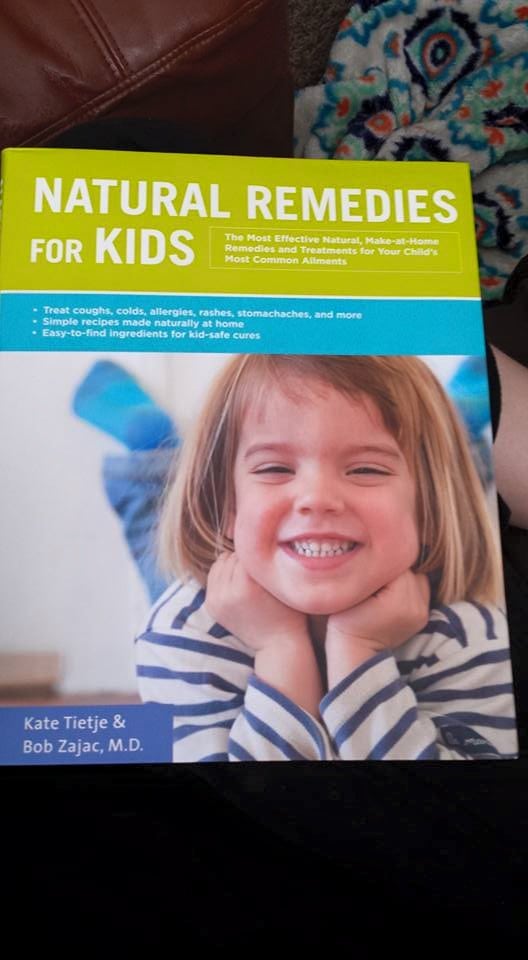Today we’re continuing our bi-monthly series, The Natural Baby. We’re experienced natural parents to five kids, and we’re taking you on a journey through our fifth baby’s first year of life. Every two weeks we’re focusing on a different topic related to raising a naturally healthy baby.
So far in the series:
And now, we’re talking about healthy gut flora!
The Natural Baby: Healthy Gut Flora
What does a healthy gut matter?
I’m glad you asked, because the answer is — it matters a lot. The bacteria in our guts impact whether we get sick or not, if we’re overweight, if we struggle with autoimmune issues, and a whole lot more. It affects our personality, whether we’re depressed, if we have anxiety. The gut is sometimes referred to as the “second brain” because it has so much to do with who we are!
The best time to establish healthy flora is in infancy. It fluctuates a lot in the first several weeks, and slowly becomes more established as baby ages. By 6 months, most infants’ guts have matured significantly, and their flora is more stable. It will continue to change with the introduction of food, and by one year of age, be pretty well set for life (sort of).
So! These early weeks and months matter a lot.
Establishing Healthy Gut Flora for Breastfed Babies
Awhile back, I posted 5 Ways to Establish Healthy Gut Flora in Your Newborn. I recommend reading that first, as it discusses what you need to do in the first few days and weeks — at birth and soon after.
Now, regardless of birth, let’s talk about what to do if you’re breastfeeding to establish baby’s flora.
1. Breastfeed on Demand
Simplest first — keep breastfeeding, and do so on demand. The single most important thing you can do for your baby’s gut right now is to breastfeed him or her exclusively and as much as needed.
2. Take Probiotics
Take a quality probiotic supplement yourself. I like and take both Garden of Life, and Hyperbiotics. (EDIT: I can no longer recommend Garden of Life since they were acquired by Nestle in December 2017). The goal is to get a wide variety of strains, but especially lactobacillus and bifidobacteria. These are the key families for your baby’s gut, and when you take them they’ll get to your baby.
3. Wait on Food
Don’t introduce solids to your baby too early. Give your baby’s gut time to mature before introducing them. No earlier than 6 months, and some babies will not be ready until 8 – 12 months.
4. Cut out Sugar
For you, that is. Sugar feeds the bad bacteria, and they don’t need any help. This is especially important if you or baby has eczema, struggles with constipation or diarrhea, is gassy often, has food allergies, or any other digestive issues. Stick to small amounts of raw honey and avoid any cane sugar at all (even organic).
5. Eat and Drink Enough
A lot of people just don’t eat enough, and breastfeeding moms need more than usual. Don’t worry about counting calories (it’s useless anyway) or any other restrictions (this won’t help you lose weight), just eat lots and lots of healthy foods. Plenty of whole grains, pastured meats, raw dairy, organic fruits and veggies, etc. This will keep your digestion regular, so that food isn’t sitting there longer than it should. Old food feeds the bad bacteria too! Complete digestion, from eating to elimination, should take no more than 24 hours. If you are already dealing with constipation, more regular eating habits, probiotics, more water, and magnesium supplements should help.
Establishing Healthy Gut Flora for Non-Breastfed Babies
We all know that breastfeeding isn’t always possible. And in that case, the approach is going to be different. It is still possible to establish healthy gut flora, but it is a little bit harder. Breastmilk is the biologically normal food, and other foods are not always ideally suited to what baby needs. But! Life isn’t perfect so other options are needed.
1. Choose Quality Formula
Most formulas are, unfortunately, based on dairy and corn syrup solids. These are not healthy, and they’re too low in fat and cholesterol for baby’s developing brain. There are a couple of better options out there — my formula-feeding friends say that Baby’s Only Organic and Holle are good commercial brands. My personal preference would be to make homemade baby formula if I could not breastfeed. There are a lot of recipes out there, but I’d probably tweak them if I needed to use one. I’ve heard from many moms that their babies did almost as well on homemade formulas as they did on breast milk. I’ll be sharing one in the next couple of weeks.
2. Give Infant Probiotics
Most formulas don’t contain probiotics at this time. Add a dose of a probiotic formula made specifically for infants to your baby’s formula once a day. Good options include Udo’s Infant, ProBiota Infant, or Klaire Labs.
3. Give Healthy Fats
If your baby is on a homemade formula, you shouldn’t need to add anything else. Most commercial formulas, however, lack cholesterol and omega-3s. Adding 1/4 tsp. of cod liver oil and 1 tsp. of cream per day can make up for the cholesterol and omega-3s. The cod liver oil I would personally consider very necessary; I give it to all my babies once they are eating mostly food and not nursing as much (and I take it myself while nursing).
4. Wait for Foods, But Not Too Long
While exclusively breastfed babies should wait until after 6 months, formula-fed babies may benefit from earlier solids. They’re already eating “other foods” (and aren’t regularly getting exposed to lots of different foods via whatever mom eats) and may prevent sensitization by early exposure. Plus, sometimes a little extra nutrition is beneficial.
Don’t start with grains because they’re hard to digest. Especially if you’re starting early — and not earlier than four months — try bits of liver cooked in chicken stock and pureed, mashed ripe avocado, egg yolks, and plain yogurt. These are very easy to digest and very nutrient-dense. Start slowly and add a little at a time. Some babies don’t tolerate foods well this young and need to wait until 6 – 8 months. Once your baby is tolerating these foods well, you could add 1 egg yolk per day to baby’s formula.
5. Avoid Grains and Sugar
Even once baby is eating food, do not offer grains or sugar. Fruit is as sweet as food should be, and baby should be eating a variety of foods and not just sweet fruit. It’s important to try to establish gut flora with a nourishing formula with plenty of healthy fats and probiotics. Baby has no need for sugar at all (ever, really, and certainly not before their first birthday) and doesn’t need grains until around 12 – 18 months. At that point it’s fine to introduce grains slowly.
Our Experience
We’ve dealt with a variety of gut situations around here. Our oldest had a lot of food allergies, eczema, and other issues and needed quite a bit of help once we learned about healthy guts. Our second was much better, and we delayed solids until around 8 months.
Our last three have all had good gut flora, although they have had issues at times with less frequent pooping or stinky gas if I wasn’t eating enough or forgot to take my probiotics. Eating enough, drinking enough water, and taking probiotics are so important!
In fact — and this has nothing to do with infants — I found some of my “morning sickness” symptoms didn’t subside until weeks after baby arrived, once I started taking my probiotics regularly. I continued to feel oddly nauseous or gag over certain foods until after I had taken them for a week or so. I was a little mad to think I could have felt better during much of the pregnancy if I’d taken the supplements sooner!
Natural Remedies for Your Little Ones!
Guess what? My brand-new book, Natural Remedies for Kids, is officially here!! (That’s my very first author copy above!)
I’m pretty excited about that. If you haven’t read yesterday’s post, which has all the awesome launch deals in it, and a huge giveaway, you will want to check that out right now. The book will help you to be prepared for this winter — it’s got everything you need for sniffles, sneezes, coughs, and tummy aches. Many of the remedies are super simple to make and can be prepared in minutes (a lot of the herbal teas, for example). A few need some time to sit before you can use them, like tinctures. Now’s the time of year to start making your remedies so that when someone says “I don’t feel well” you’re ready!
Promise, mama — it’s easier than it looks. 🙂 Grab your copy of Natural Remedies for Kids right now!
How do you encourage healthy gut flora?
SaveSave










Fermented foods are very important in keeping the gut health. My son suffered from eczema for a long time. Removing gluten and dairy from his diet and healing his gut (using whole foods, probiotics, L-Glutamine, etc.) decreased inflammation in his body and allowed his skin to heal.
This was a great article. Thank you! “Natural remedies for kids” sounds like an awesome book.
It is a great piece of information for those who are first time mothers and it will also help others. Thanks for sharing this and I will share it with my friends who have babies.
Please share the foo chart for keeping baby healthy.
My 2 month old is dealing with gas. I thought at first it was due to his lip and tongue ties and taking in too much air. We had the ties fixed and I’ve seen a lactation consultant about the latch, but he’s still gassy. Belches a lot and has flatulence. I am paleo and have been taking Biokult. He’s been on Evivo (b. Infantis) for the last few weeks. The only thing that stuck out in your article was my sugar intake, which I am working on, as well as my water intake. Any other tips or ideas? My first didn’t have this problem.